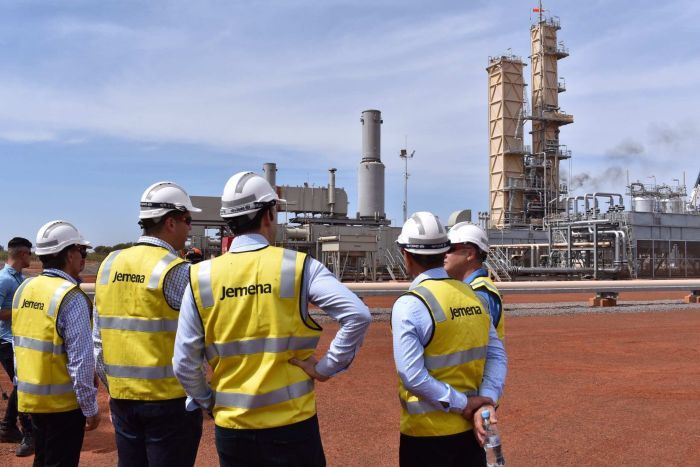
NT on cusp of becoming gas centre of Australia as Queensland gas connector pipeline opens
Posted

Photo:
The Jemena project was officially opened in the Northern Territory, linking Tennant Creek and Mount Isa. (ABC News: Katrina Beavan)
A flagged expansion of a major new gas pipeline running from the Northern Territory outback to Queensland could meet the gas demands in Brisbane, Sydney and Adelaide, say officials.
Key points:
- The Northern Gas Pipeline opens in the NT, connecting Central Australia to the Queensland gas grid
- Conglomerate Jemena has flagged an expansion of the pipeline project despite only having 80 per cent of the contracts needed to do so
- Environmental groups continue to oppose the project as politicians refute their claims
Asian conglomerate Jemena began construction on the $800 million, 622 kilometre Northern Gas Pipeline, to run from Tennant Creek to Mount Isa about 18 months ago, and today it was officially opened in the NT.
The first transport of commercial gas is set for January.
Jemena officials said the company has begun consultations for a possible expansion, even though the current pipeline is only 80 per cent contracted.
Federal Resources Minister Matt Canavan said the pipeline would help with an east coast gas shortage and was the “missing link” in the market.
“Having a pipeline that connects the centre of Australia to eastern markets, helps us develop and become more connected as a country” said Mr Canavan.
“The Territory is becoming the centre of gas production in Australia, it’s on the cusp of doing that.”
NT Resources Minister Ken Vowles said such developments meant the Territory was no longer the “backwater” of Australia.
He said the NT was happy to do the heavy lifting and supply gas to the rest of the country, and could become the gas hub of Australia.
Expansion flagged despite contract shortfall
Jemena officials said the pipeline would transport 90 terajoules of gas to Mount Isa every day, but if the proposed expansion went ahead, that could grow to 700 terajoules a day.
Managing director Frank Tudor said that amount of gas would meet the daily needs of Sydney, Brisbane and Adelaide combined.

Photo:
The company hopes an expansion of the pipeline would help supply gas to Sydney, Adelaide and Brisbane. (ABC News: Katrina Beavan)
The company said it was in negotiations to fill the remaining 20 per cent and was confident it could source enough gas to justify an expansion to the east coast.
“[This pipeline] was based on 80 per cent, it makes economic sense for our investors as a standalone investment,” Mr Tudor said.
Currently the gas is being sourced from conventional gas resources, the Black Tip Point reserve and the Mereenie Field in Central Australia.
However, the expansion of the pipeline was contingent on the NT’s fracking moratorium being lifted, which happened earlier this year.
Mr Tudor said Jemena was closely monitoring the development plans of all companies working in the Beetaloo Basin.
“We are hoping to work with customers to fill [the current pipeline] up to 100 per cent and the Beetaloo Basin will take it into expansion mode.
“We’d expect that as they develop their plans we’ll be there with them developing pipeline infrastructure.”
Although the pipeline currently only supplies commercial customers, Mr Tudor said if the expansion did go ahead, it could significantly reduce gas bills.
“This gas, which is domestic gas, which is reliable, which is stable, which has a whole lot of regional development benefits, is being delivered at half the cost of imported gas if you were looking at importing gas from LNG terminals.”
Vocal opposition against project
Environmental groups in the NT have long opposed the pipeline and any expansions, and said they would continue to campaign against further development.
Nicole Pietsch from the Arid Lands Environment Centre claimed there was no gas shortage, and rather, gas companies were exporting supplies overseas.
However, Mr Canavan refuted that claim.

Photo:
Northern Australia Minister Matt Canavan (centre) said the NT was “on the cusp” of being a gas production hub. (ABC News: Katrina Beavan)
“Those people are not paying attention to gas markets in eastern Australia,” he said.
“We’ve had a very difficult situation, we’ve had to take unprecedented action to put in gas export controls for the first time in our history.
“It’s not ideal, it would be much better to produce more gas in places like here in the Territory, so we have sufficient gas for the whole country.”
Mr Vowles criticised environmental groups that had come up from down south and “hijacked” Aboriginal people to stop them from having mining or gas projects developed on their land.
Mr Tudor said the company had made a submission in response to those claims.
“We’re participating in that process, we’ve made a submission and that will run its course,” he said.
The situation is not the only opposition the company has faced, with the pipeline being fraught with controversy over the last couple of years.
Jemena planned to begin construction in April 2017 but was delayed three months after troubled negotiations with traditional owners.
Jemena then severed ties with construction partner McConnell Dowell during resequencing, only to re-hire them to complete the NT portion of the project.
However, once planning and construction began, 1,100 jobs were created in total, with $52 million spent on contractors in the Territory.
Jemena said an expansion would cost $3-$4 billion and mean 4,000 jobs in total.
Topics:
construction-projects-and-equipment,
